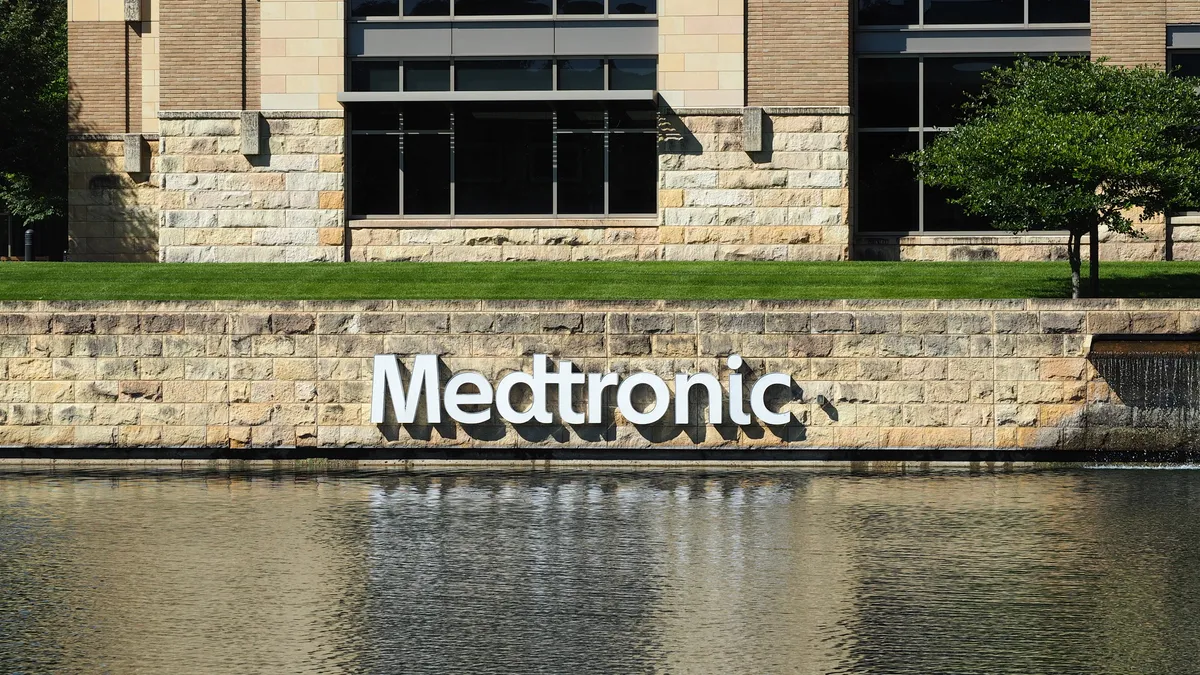Dive Brief:
-
Medtronic reported multidrug-resistant hypertensive patients treated with its Symplicity renal denervation device continued to experience sustained blood pressure reductions at three years.
-
The registry data, which were presented at PCR e-Course 2020 on Thursday, reveal a trend seen one year ago, adding to the evidence that Symplicity improves outcomes in a hard-to-treat population.
- The update comes months after the success of Symplicity in a randomized clinical trial gave a boost to Medtronic’s long-running effort to win FDA approval for a renal denervation device.
Dive Insight:
Medtronic has been persistent with its contention that decreasing the activity of nerves in the kidney can help lower blood pressure, even in the face of evidence to the contrary. In 2014, Medtronic’s Symplicity failed a key clinical trial, eliminating its chances of winning a near-term approval and lowering expectations for the entire renal denervation field.
However, since then, Medtronic and ReCor Medical have begun to rebuild interest in the approach with data on its safety and efficacy, culminating in the success of Symplicity in a randomized clinical trial presented earlier this year.
Medtronic used the virtual replacement for the canceled EuroPCR meeting to share more data on its device. The results came from the Global Symplicity Registry that Medtronic has used to track 2,500 patients treated with its renal denervation system for three years.
Based on the most recent analysis, the average three-year reduction in office blood pressure stood at 16.7mmHg. That figure is greater than the 15.3mmHg reduction seen two years after treatment, and the 16.5mmHg decline reported in an earlier three-year analysis when Medtronic had tracked fewer patients for that length of time. Medtronic reported a similar trend in ambulatory blood pressure.
After three years, 39% of patients had office blood pressure of 140mmHg or below, compared to 13% at baseline and 37% after two years. The trend was mirrored by a decline in the proportion of people with an office blood pressure above 160mmHg, which fell from 60% at baseline to 27% after three years.
Felix Mahfoud, the Saarland University Medical Center cardiologist who presented the data, said the improvements happened despite a slight decrease in the average number of hypertension medicines taken by subjects. While not clinically meaningful, the medication decrease shows “blood pressure falls are unlikely [to be] related to an intensification of the number of drugs prescribed to patients,” Mahfoud noted.
On average, participants in the study had been prescribed 4.6 classes of antihypertensive drugs prior to treatment with Symplicity. Despite the intensive treatment, the average office blood pressure at baseline was 166mmHg.
Medtronic linked Symplicity to significant reductions in office blood pressure in patients prescribed varying numbers of medications. The magnitude of the improvement was fairly consistent regardless of whether a patient had received one medication or more than five. Mahfoud called the safety of the device “excellent,” pointing to the 0.3% rate of renal artery stenosis to make his case.
Achieving those results in what Mahfoud called the “largest dataset available so far” and a “pretty sick patient population” provides a boost to Medtronic’s efforts to bring Symplicity to market. Medtronic now has breakthrough device designation and positive data from a randomized clinical trial, plus the registry data showing the long-term safety and efficacy of renal denervation.










